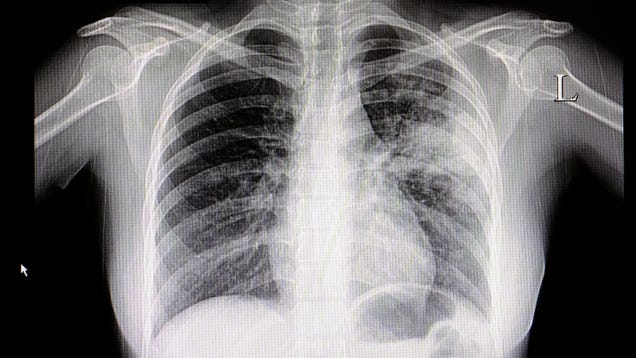
The worst-case scenario with coronavirus is not mass death. It’s that people come to accept mass death—to accept that someone will die in the U.S. every 30 seconds as “just how it is.” Yet that is the proposition being thrust on us now.
Yesterday, 2,746 people died of covid-19 in the U.S., the highest daily death toll recorded since the first confirmed deaths on American soil in February. That’s on the high end of leaked Trump administration forecasts for this time period and shows the 3,000 daily deaths come June in those forecasts might be wishful thinking. This is, in a word, horrific. But the Trump administration and its backers from conservative media to the small but vocal “reopen” movement are trying to convince people it’s not only normal but worth it.
They have turned the idea we should avoid the Bad Thing—namely, the needless deaths of thousands of Americans—on its head, arguing we should embrace it full-on and just plow forward with reopening the country. It’s a monstrous idea in the here and now, but it also sets up a dangerous precedent, priming people to accept policy failure—or, worse, reject legitimate policy solutions—on what remains the biggest issue facing humanity: climate change. Unless we demand more from our leaders and each other, we risk an even bigger catastrophe in our lifetimes.
There is nothing acceptable about 3,000 people dying every day from coronavirus. What’s so nauseating about this is that we know what it looks like to contain the virus. We’ve seen it in action. Countries as diverse as South Korea, New Zealand, and Vietnam have all successfully flattened the curve of death and suffering. The steps they broadly followed are proactive lockdowns and a slow reopening as the curve of infections flattened followed by contact tracing, mass testing, and ensuring frontline workers have ready access to personal protective equipment.
The U.S. could do this. Instead, next to none of it is happening, and the steps that are being taken are half measures at best for a country of this size and geographical scope. At best, we have a patchwork of state-level responses, and few if any can be called adequate. As David Wallace Wells writes in New York Magazine, “[t]here is still no plan for the end of the coronavirus crisis.”
Indeed, instead of taking steps to try to wind down the pandemic here, the plan is to use it as a bludgeon in the culture war. Donald Trump has recently and repeatedly described citizens as “warriors.” No doubt his word choice was influenced by the Call of Duty cosplay going on on the steps of state capitol buildings around the country, a movement to end the life-saving lockdown measures, which Trump has thrown his support behind. The president’s rhetoric only further turns coronavirus into a way to divide people, inviting them to take selfish measures under the banner of a nebulous concept of “freedom.”
In the narrow view of the “reopen” protesters, freedom means the government plays no role in protecting the greater good, that you don’t owe your fellow humans anything, that being able to get Chick-fil-A without wearing a mask is an essential expression of liberty and worthy of 3,000 people losing their lives. It also shows some kind of magical thinking that you or a loved one won’t be among the 3,000 people that die on a given day next month after succumbing to fluid filling their lungs or heart failure.
In some ways, it’s the logical extension of the conservative movement, which has put individualism and corporations over the public good. A “reopen” protester will argue that that the government should get out of the way and allow anyone who wants to go back to work, or to the store, or to a beach to do just that. Anyone who’s afraid of getting covid-19 is welcome to stay home. That reasoning, however, will lead to greater rates of infection, according to health experts, which puts everyone at increased risk regardless of how they feel about lockdown orders.
At the same time as the economy craters because people cannot work without risking death, there’s been precious little support for workers compared to other developed countries (something that, again, the federal government could address if it wanted to). That’s led to anger that has, in part, spilled over and fueled the culture war on the ground, which is largely aimed at governors trying to protect the public’s health. The idea that there is an individualist solution to the pandemic is laughable, yet that is both what the Trump administration and rank and file conservatives have set their sights on. That’s why the movement to “reopen” plays down the death toll and plays up the perceived injustice of taking actions to not spread a deadly virus. In essence, it’s a rejection of society itself.
“Sometimes when people feel vulnerable or angry, their aggression can take the form of wanting others to suffer, like a sense of revenge or retaliation against perceived injustice,” Wendy Greenspun, a clinical psychologist practicing in New York who has focused on the climate crisis in recent years, tells Earther. “This is the darker side of our humanity, and not easy to look at. And sometimes that kind of aggressive wish is bolstered by others who band together, uniting against a perceived enemy.”
It’s depressing in any light, but especially as a climate person. For decades, climate action has been held hostage by a small minority of liars and Republican politicians to profit a few fabulously wealthy companies. Today, more than three-quarters of Americans are worried about climate change and want action. Majorities support a variety of policies under the Green New Deal and a green stimulus, including conservatives. Yet the federal government has shown no appetite to actually do that, remaining captured by fossil fuel interests, the status quo, and fear of the astroturf opposition.
There’s been this nagging feeling I’ve had since the start of the lockdown protests and the zero empathy shown by Trump. It’s tempered my optimism that now is a time to build something new. While it’s still very much possible to use this moment to build a better, just future, it’s clear that there is a group of people who will violently fight tooth and nail against that even if it means people die unnecessarily. And some leaders are willing to cave and risk the greater good.
The reopen movement provides the political cover for politicians to ignore the science and popular will to enact shortsighted policies—and throw up their hands when more people get sick and die. It also gives us a preview of how some people and leaders will respond to the steps necessary to address climate change, which will require similar bold actions that will upend the status quo.
The best available science tells us drawing down emissions rapidly this decade is our best shot at protecting the climate and humanity. Even then, people will still die, and we should absolutely mourn that fact. But more than that, we should be mad as hell that fossil fuel companies and pliant politicians have made that the best case scenario while also doing their damnedest to ensure we don’t even get that.
The idea that we can reopen the U.S. in the face of the coronavirus risks is as hollow as thinking we can do nothing about carbon emissions. Both will end in the same place: needless death in the service of selfishness. In the case of the climate crisis, that death will be so much more widespread, encompassing the entire biosphere that has allowed humanity to thrive.
Look, I get it. The coronavirus pandemic is a fucking nightmare, and so are the consequences of lockdowns. With no vaccine on the immediate horizon, a cratering economy, and a rudderless government haphazardly doling out paltry relief funds, these are terrifying times. The climate crisis is similarly terrifying by requiring us to think completely differently about the way the world is constructed and build something new, something that doesn’t exist yet.
Anyone that tells you we don’t have a choice in solving either problem, that we must simply accept our lot as foot soldiers in the service of the economy, and that division is the only way forward is lying. We do have a choice, and mass death is not acceptable nor inevitable. But more than anything, the only way through both these crises is banding together and finding what Greenspun called the “sweet spot between feeling the urgency and then not being so overwhelmed and hopeless that you give up.”
Source: gizmodo.com








